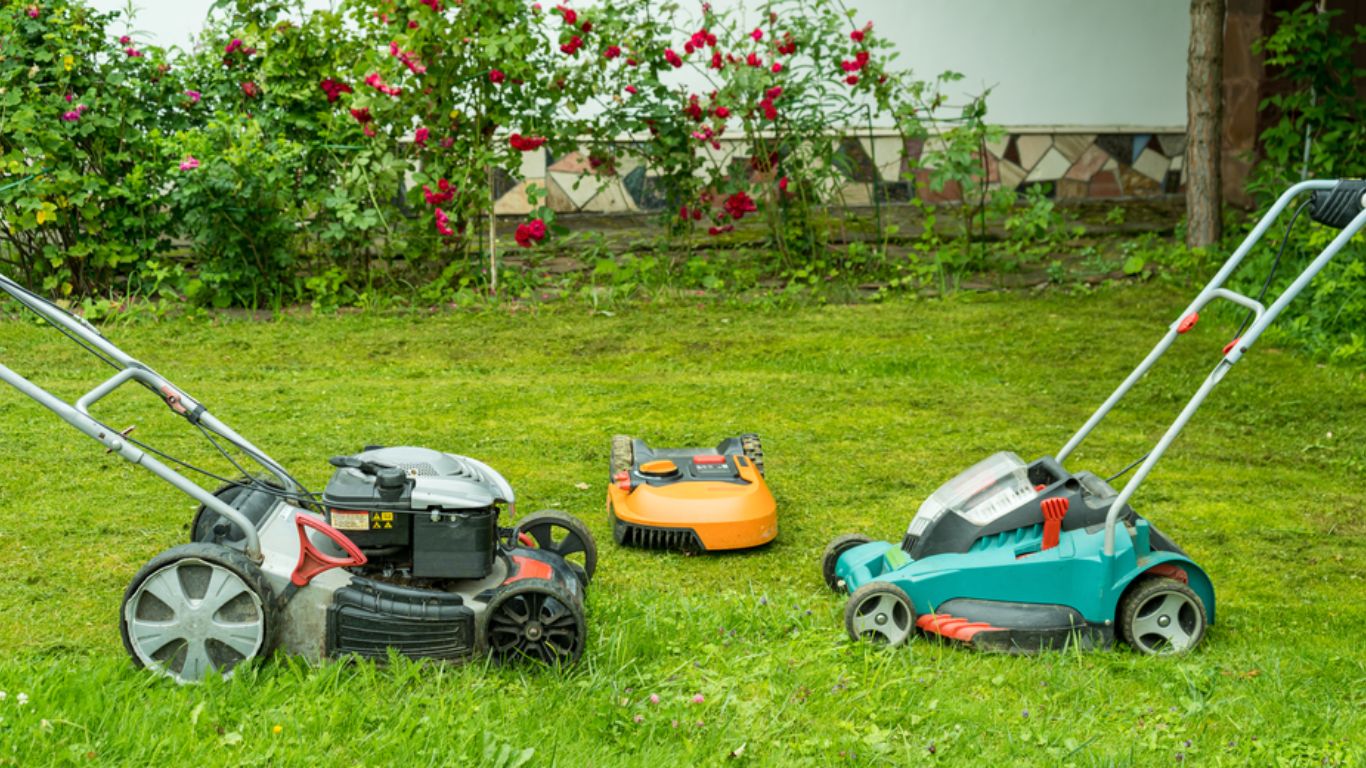When it comes to maintaining your lawn, the debate between electric vs gas lawn mower has intensified in recent years. As the team at Best Lawn Mower For Hills, we’ve witnessed firsthand the evolution of these machines and their impact on homeowners’ choices. The decision isn’t just about cutting grass anymore; it’s about balancing performance, cost, environmental impact, and convenience. Whether you’re tending to a postage-stamp yard or a sprawling estate, the mower you choose can make or break your lawn care routine.
In this comprehensive guide, we’ll cut through the noise and dig deep into the pros and cons of electric and gas mowers. We’ll explore everything from cutting power to long-term costs, helping you make an informed decision that aligns with your lawn care needs and personal values. Buckle up as we rev our engines and spark a discussion on this electrifying topic.
Understanding Electric and Gas Lawn Mowers
Before we dive into the nitty-gritty comparisons, let’s get a grip on what sets these two types of mowers apart. Electric and gas mowers each have unique characteristics that influence their performance, maintenance needs, and suitability for different lawn care scenarios.
Electric Lawn Mowers
Electric mowers have surged in popularity thanks to advancements in battery technology and a growing focus on eco-friendly yard care. These quiet operators come in two main flavors:
- Corded Electric Mowers: These plug-in powerhouses offer consistent cutting strength without the worry of running out of juice. They’re ideal for smaller yards where an outlet is always within reach. However, managing the cord can be a dance of its own, requiring careful maneuvering to avoid turning your lawn care into a tangled mess.
- Battery-Powered (Cordless) Mowers: Freedom of movement is the name of the game here. These mowers run on rechargeable batteries, offering the flexibility to roam your entire lawn without being tethered. The trade-off? Runtime limitations and potential power decrease as the battery drains. Recent models boast impressive battery life, but for larger lawns, you might need a spare battery on deck.
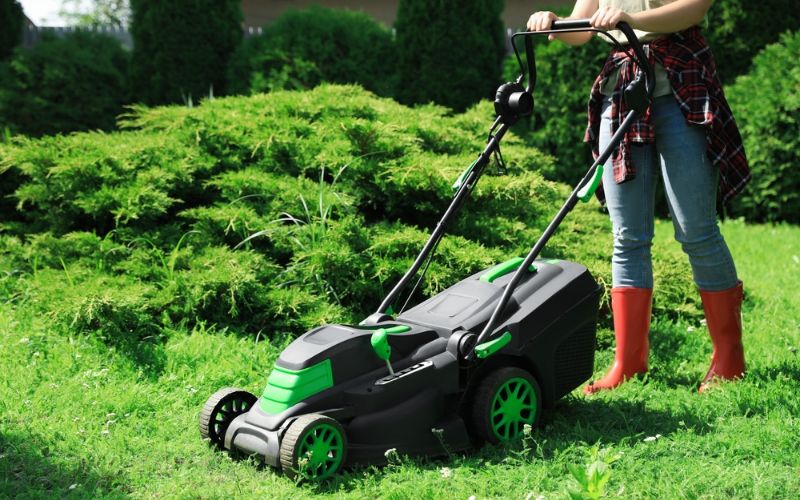
Gas Lawn Mowers
The old guard of lawn care and gas mowers are known for their raw power and endurance. They come in various types, from simple push mowers to self-propelled beasts that can tackle hills with ease. Gas mowers shine in their ability to handle tough grass and large areas without breaking a sweat. However, they bring along the baggage of regular maintenance, fuel storage, and a bit more noise than their electric counterparts.
Both electric and gas mowers have their place in the lawn care ecosystem. The key is matching the right tool to your specific lawn and lifestyle needs.

Performance comparison of Electric Lawn Mowers and Gas Lawn Mowers
When pitting electric against gas lawn mowers, performance is where the rubber meets the grass. Let’s slice through the marketing hype and examine how these mowers stack up in real-world conditions.
Cutting Power and Efficiency
- Electric Mower Performance: Electric mowers have come a long way. Modern models pack a surprising punch, especially when tackling well-maintained lawns. Their consistent power delivery means smooth cutting from start to finish. However, they may struggle with overgrown or wet grass, requiring multiple passes to achieve a clean cut.
- Gas Mower Performance: Gas-powered machines are the heavyweight champions of the lawn. Their robust engines provide relentless cutting power, making short work of thick, tall, or damp grass. For those with challenging terrain or large properties, gas mowers often prove more efficient, reducing overall mowing time.

Comparative Analysis for Different Lawn Types
- Small, flat lawns: Electric mowers shine here, offering ample power without overkill.
- Medium to large lawns: Gas mowers typically have the edge, especially if the grass is dense.
- Hilly terrains: While some high-end electric models perform admirably, gas mowers generally dominate on slopes.
- Wet or overgrown lawns: Gas mowers pull ahead, their extra oomph cutting through tough conditions with ease.
Cutting Quality
- Evenness of Cut: Both types can deliver a carpet-like finish, but consistency is key. Electric mowers often provide a more uniform cut on level ground, thanks to their steady power output. Gas mowers, while powerful, may leave patches if the engine speed fluctuates.
- Mulching Capabilities: Many modern mowers offer mulching options. Gas mowers traditionally held the advantage here, their higher power helping to finely chop clippings. However, advanced electric models now rival their gas counterparts with specially designed blades and motors optimized for mulching.
- Bagging Effectiveness: When it comes to collecting clippings, both have their strengths. Electric mowers often excel at collecting dry, thin grass. Gas mowers, with their stronger suction, typically perform better with damp or thick clippings. The right choice depends on your lawn’s characteristics and seasonal changes.
In the electric vs gas lawn mower battle, performance isn’t just about raw power. It’s about finding the right balance of strength, efficiency, and cut quality for your specific lawn. As we always say, the best mower is the one that leaves your lawn looking like a green carpet with the least amount of sweat on your brow.
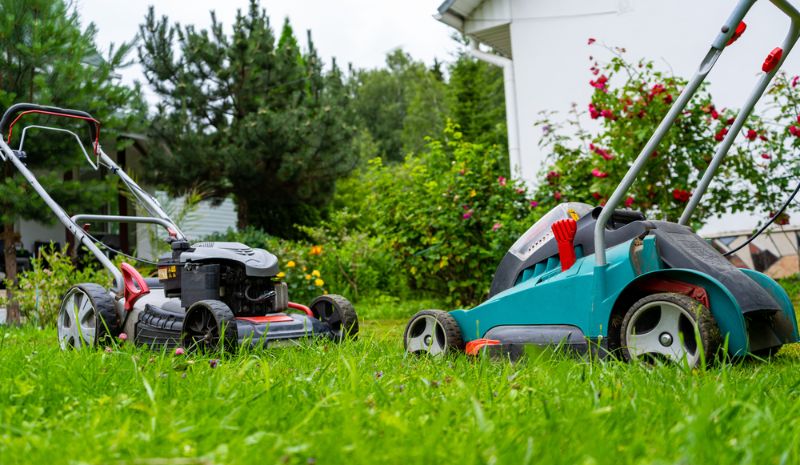
Cost Analysis
When weighing electric vs gas lawn mowers, the price tag is just the tip of the financial iceberg. At Best Lawn Mower For Hills, we believe in looking at the full picture – from the moment you swipe your credit card to the last drop of fuel or electron used. Let’s break down the dollars and cents of owning each type of mower.
- Price Ranges for Electric Mowers: Electric mowers span a wide price spectrum. Budget-friendly corded models start around $100, while high-end cordless versions with all the bells and whistles can set you back $500 or more. The sweet spot for a quality cordless mower typically falls between $200 and $400.
- Price Ranges for Gas Mowers: Gas-powered mowers generally command higher upfront costs. Entry-level push mowers begin around $150, but feature-packed self-propelled models can easily exceed $600. For most homeowners, a solid gas mower will likely fall in the $300 to $500 range.
- Electricity Costs for Electric Mowers: Plugging in comes with perks. Corded mowers add mere pennies to your electric bill per mowing session. Battery-powered models are similarly thrifty, with a full charge costing about 10 cents on average. Over a season, you’re looking at $5 to $10 in electricity costs.
- Fuel Costs for Gas Mowers: Fill-ups add up. A typical gas mower burns through 1-2 gallons of fuel per hour of use. With fluctuating gas prices, you could spend $30 to $60 or more per season on fuel alone. Don’t forget the gas can and stabilizer for storage.
Maintenance Expenses
- Electric Mower Maintenance Requirements and Costs: Electric mowers are the champions of low maintenance. Annual costs typically don’t exceed $20 for blade sharpening. Battery replacement every 3-5 years is the main expense, ranging from $50 to $200 depending on the model.
- Gas Mower Maintenance Needs and Associated Expenses: Gas mowers demand more TLC. Annual tune-ups, oil changes, air filter replacements, and spark plug swaps can add up to $50-$100 per year. Factor in potential carburetor cleaning or replacement, and costs can spike.
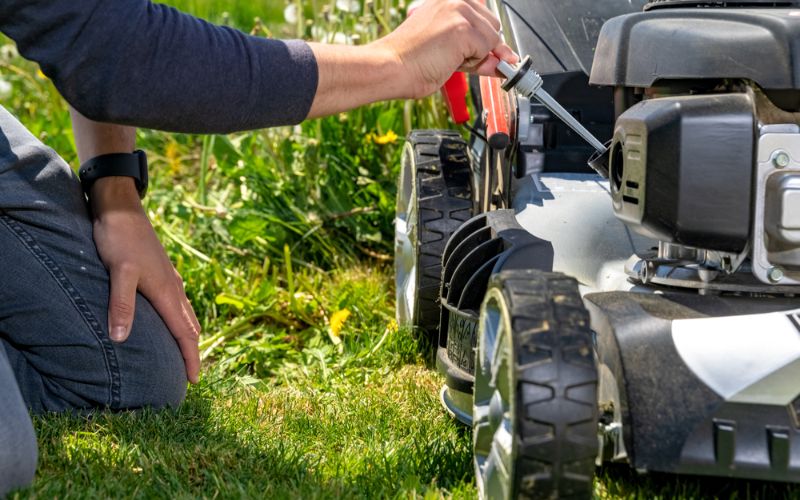
Long-term Cost Comparison
Over a 10-year lifespan, an electric mower often proves more economical. While the initial investment might be similar or slightly higher, the savings in fuel and maintenance can offset this within 3-5 years. Gas mowers, despite higher running costs, may still win out for those with large lawns due to their durability and power.
The verdict? For small to medium lawns, electric mowers often provide the best bang for your buck in the long run. But for larger properties or those tackling tough terrain regularly, the extra muscle of a gas mower might justify the added expense. Remember, the cheapest option isn’t always the most cost-effective – consider your lawn’s specific needs when making your choice.
Environmental Impact of Electric Lawn Mowers vs. Gasoline Lawn Mowers
In today’s eco-conscious world, the environmental footprint of our lawn care choices matters more than ever. Let’s examine how electric and gas mowers stack up when it comes to Mother Nature.
Emissions
Electric Mowers: Indirect Emissions from Power Generation: Electric mowers boast zero direct emissions, but they’re not entirely off the hook. Their environmental impact depends on your local power grid. If your electricity comes from renewable sources, you’re mowing with a clean conscience. However, areas relying on fossil fuels for power generation indirectly contribute to emissions. The good news? As power grids become greener, so does your mower’s footprint.
Gas Mowers: Direct Emissions and Environmental Concerns: Gas-powered mowers are the heavyweight polluters of the lawn care world. A single hour of mowing can produce as much pollution as driving a car for 100 miles. They emit a cocktail of harmful substances:
- Carbon dioxide (CO2): A major greenhouse gas
- Carbon monoxide (CO): Toxic to humans and animals
- Nitrogen oxides (NOx): Contributors to smog and acid rain
- Hydrocarbons: Key ingredients in ground-level ozone formation
Moreover, fuel spills during refilling can contaminate soil and water sources. The EPA estimates that millions of gallons of fuel are spilled each year just from filling lawn equipment.

Noise Pollution
Noise Levels of Electric Mowers: Electric mowers are the whisper-quiet option. Most models operate at around 75 decibels – about as loud as a washing machine. This means you can mow early morning or late evening without disturbing neighbors. It’s also easier on your ears, reducing the risk of noise-induced hearing loss.
Noise Levels of Gas Mowers: Gas mowers are the noisy neighbors of lawn care. They typically roar at 95-100 decibels – equivalent to standing next to a motorcycle. This level of noise can damage hearing after just 15 minutes of exposure without protection. It’s not just your ears at risk; persistent noise can stress local wildlife and disrupt ecosystems.
Neighborhood Considerations and Regulations
Many communities have noise ordinances restricting the use of loud equipment during certain hours. Electric mowers often skirt these restrictions, giving you more flexibility in your mowing schedule. Some environmentally conscious neighborhoods even offer incentives for switching to electric lawn care equipment.
In the electric vs gas lawn mower showdown, electric models clearly take the green ribbon. They offer a significant reduction in both air and noise pollution. However, the environmental choice isn’t always black and white. For those managing large properties or dealing with challenging terrain, the efficiency of a gas mower might actually result in less overall environmental impact than struggling with an underpowered electric model. We encourage you to consider your specific lawn care needs alongside your environmental values when making your choice.
Usability and Convenience of Lawn Mower
When it comes to lawn care, the ease of use can make or break your mowing experience. Let’s explore how electric and gas mowers compare in terms of user-friendliness and convenience.
Starting Mechanism
- Push-button Start for Electric Mowers: Electric mowers win the convenience race right out of the gate. With a simple push of a button, you’re ready to roll. No priming, no pulling, no fuss. This feature is particularly beneficial for those with limited upper body strength or mobility issues. It’s as easy as starting your car – just turn the key or press a button, and you’re off to the races.
- Pull-cord Start for Gas Mowers: Gas mowers traditionally require a bit more elbow grease to get going. The pull-cord start can be a workout in itself, especially on cold mornings or after long periods of disuse. While many modern gas mowers have improved their starting mechanisms, including electric start options, the majority still rely on the trusty pull cord. It’s a small hurdle but one that can be frustrating for some users.
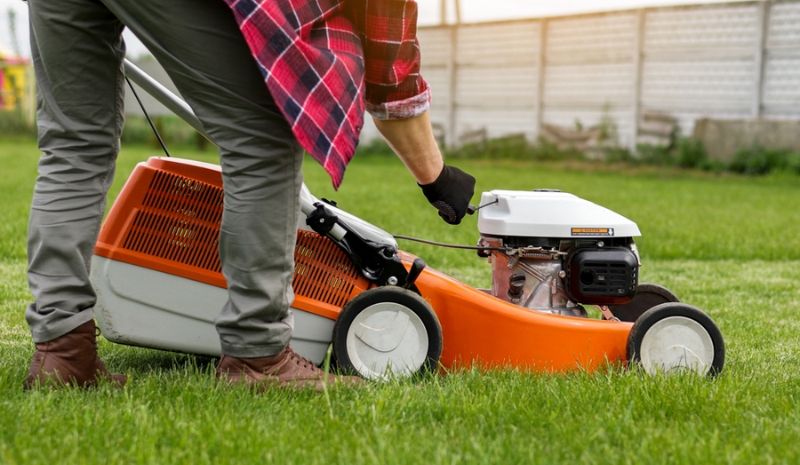
Maneuverability
Weight Comparison:
- Electric mowers, particularly cordless models, often tip the scales in favor of easy handling. Their lightweight design makes them a joy to push, pull, and turn. Most electric mowers weigh between 30-50 pounds, with some ultra-light models dipping below 30 pounds. This featherweight status is a boon for those with smaller builds or physical limitations.
- Gas mowers, built to house engines and fuel tanks, are the heavyweights of the lawn. Typically ranging from 60-90 pounds, they can be a handful to maneuver, especially on slopes or around obstacles. However, this extra heft can provide stability when tackling uneven terrain.
Handling on Different Terrains
- On flat, even lawns, both types of mowers perform admirably. Electric mowers shine in tight spaces, effortlessly weaving between garden beds and around trees. Their nimble nature makes them ideal for intricate landscaping.
- Gas mowers come into their own on challenging terrains. Their robust build and powerful engines make light work of hills, thick grass, and rough patches. For those with expansive or varied landscapes, the added oomph of a gas mower can be a game-changer.
Maintenance Requirements
Electric mowers are the low-maintenance dream. Your to-do list is refreshingly short:
- Keep the battery charged (for cordless models)
- Clean the deck after use
- Sharpen or replace the blade annually
- Occasionally tighten any loose bolts
No oil changes, no spark plugs, no air filters – just clean, simple upkeep that won’t eat into your weekend.
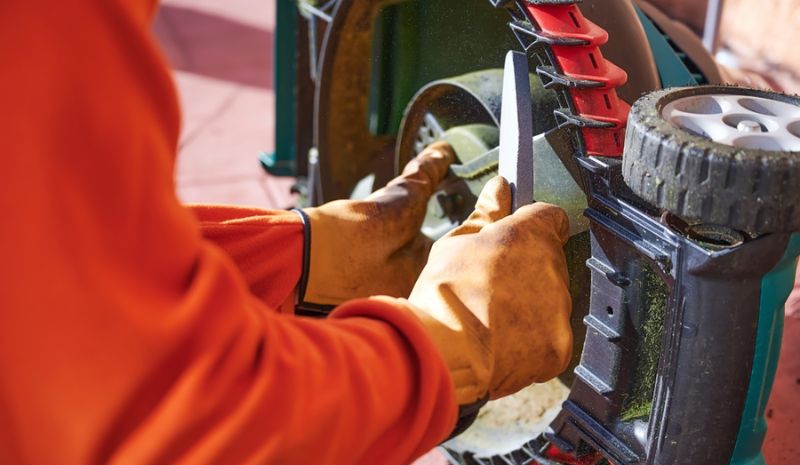
Gas mowers demand a more hands-on approach. Your maintenance schedule might look like this:
- Change oil regularly (usually every 25-50 hours of use)
- Replace air filters and spark plugs annually
- Clean or replace the carburetor as needed
- Winterize the mower for off-season storage
- Sharpen blades and tighten bolts periodically
While some find this routine therapeutic, others see it as a time-consuming chore.
Electric mowers offer unparalleled convenience for smaller, well-manicured lawns. Gas mowers, while requiring more upkeep, provide the muscle and endurance needed for larger or more challenging properties. Consider your lawn’s needs, your physical capabilities, and your willingness to perform maintenance when making your choice.
Choosing the Right Mower for Your Needs
Selecting between an electric and gas lawn mower isn’t a one-size-fits-all decision. Here are the key factors to consider when making your decision.
Assessing Your Lawn
Lawn Size Considerations
- Small Yards (Up to 1/4 acre): Electric mowers, particularly cordless models, excel here. They offer ample power and runtime for compact spaces without the hassle of gas and oil.
- Medium Yards (1/4 to 1/2 acre): This is the sweet spot where both electric and gas mowers compete fiercely. High-end cordless electrics can handle these lawns, but gas mowers start to show their stamina advantage.
- Large Yards (Over 1/2 acre): Gas mowers typically reign supreme for expansive lawns. Their endurance and power make them ideal for tackling larger areas without interruption,
Terrain Type and Obstacles
- Flat, Even Lawns: Electric mowers shine on level ground, offering smooth operation and easy maneuverability.
- Hilly or Uneven Terrain: Gas mowers, with their robust power output, generally perform better on slopes and rough patches.
- Obstacle-Rich Yards: If your lawn is a maze of trees, flower beds, and lawn ornaments, a nimble electric mower might be your best bet for precise navigation.
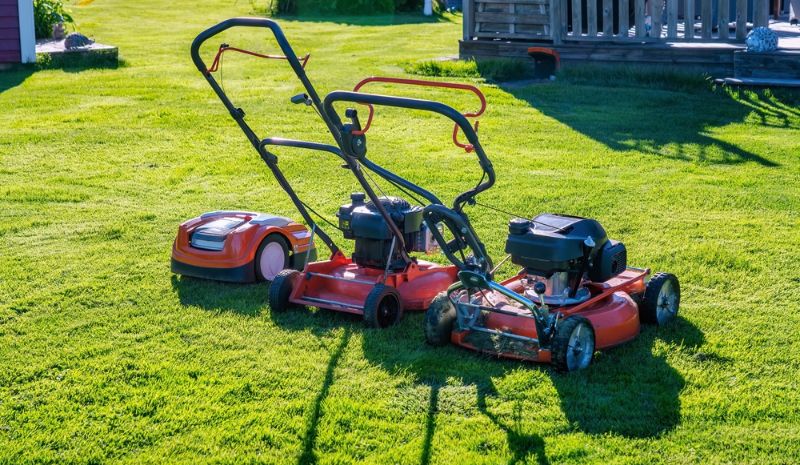
Personal Preferences
Environmental Concerns: If reducing your carbon footprint is a priority, electric mowers are the clear winner. They produce zero direct emissions and significantly less noise pollution.
Noise Tolerance
- Early Birds and Night Owls: Electric mowers’ quiet operation allows for flexible mowing times without disturbing neighbors.
- Noise-Insensitive Users: If sound levels don’t bother you or your neighbors, a gas mower’s louder operation won’t be an issue.
Maintenance Willingness
- Low-Maintenance Preference: Electric mowers require minimal upkeep, perfect for those who’d rather spend time enjoying their lawn than maintaining equipment.
- DIY Enthusiasts: If you enjoy tinkering with engines, a gas mower provides more opportunities for hands-on maintenance.
Budget Considerations
Short-term vs. Long-term Costs:
- Upfront Investment: Electric mowers, especially cordless models, often have a higher initial cost but lower operating expenses.
- Ongoing Expenses: Gas mowers typically cost less upfront but incur higher fuel and maintenance costs over time.
Value for Money Analysis
- Frequency of Use: For weekly mowing, the long-term savings of an electric mower might justify a higher initial investment.
- Durability Needs: If you require a mower that can withstand heavy use over many years, a robust gas model might offer better value despite higher running costs.
Expert Recommendations and Test Results
We’ve put countless electric and gas mowers through their paces, and we’ve gathered insights from industry experts and professional landscapers. Let’s dive into what the pros have to say about the electric vs gas lawn mower debate.
Our Findings
We have conducted extensive evaluations of both electric and gas mowers. Their findings offer valuable insights for homeowners weighing their options.
Performance Test Results
- Cutting Evenness: High-end electric mowers matched or surpassed gas models in achieving a uniform cut on level terrain.
- Mulching: Gas mowers still hold a slight edge in mulching performance, especially with wet or thick grass.
- Bagging: Both types performed well, with some electric models surprising testers with their efficient clipping collection.
- Runtime: Cordless electric mowers have seen significant improvements, with top models now able to tackle up to 1/2 acre on a single charge.
Reliability Ratings
- Electric Mowers: Generally scored high in reliability, with fewer moving parts leading to fewer breakdowns.
- Gas Mowers: While some models excelled, others faced issues with carburetors and starting mechanisms over time.
- Long-term Durability: Gas mowers still lead in this category, often lasting longer under heavy use conditions.
Professional Landscaper Insights
We’ve tapped into the collective wisdom of professional landscapers who use these tools day in and day out. Their real-world experience offers a unique perspective on the electric vs gas mower debate.
Commercial Use Considerations
- Power and Endurance: For large-scale commercial operations, gas mowers remain the go-to choice due to their uninterrupted run time and consistent power output.
- Versatility: Gas mowers handle a wider range of grass conditions, from overgrown residential lawns to well-manicured commercial properties.
- Fleet Management: Some landscapers are incorporating electric mowers for smaller jobs or noise-sensitive areas, creating a hybrid fleet to meet diverse client needs.
Durability and Longevity Observations
- Build Quality: High-end models of both types have shown impressive durability, but gas mowers generally withstand rougher handling.
- Battery Lifespan: A key concern for electric mowers, with most professionals reporting 3-5 years of heavy use before significant battery degradation.
- Repair and Maintenance: Gas mowers are often easier to repair in the field, a crucial factor for minimizing downtime.
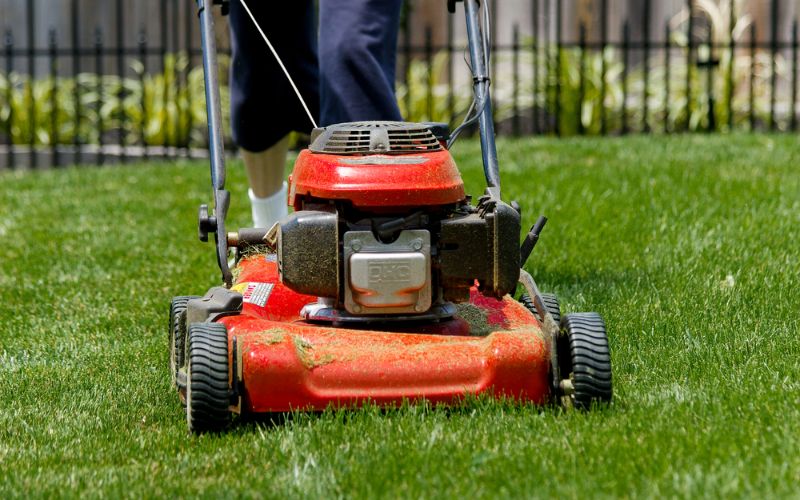
Conclusion
As we wrap up our deep dive into the electric vs gas lawn mower debate, it’s clear that both options have their merits. At Best Lawn Mower For Hills, we’ve seen firsthand how the right choice can transform lawn care from a chore into a satisfying task. Whether you’re swayed by the quiet efficiency of electric models or the raw power of gas mowers, the key is matching your tool to your terrain and preferences. As technology marches forward, bridging the gap between these two options, the future of lawn care looks brighter – and greener – than ever. Remember, the best mower isn’t just about cutting grass; it’s about cultivating a lawn you’ll love spending time in. Choose wisely, and happy mowing!
FAQs
Which is better for large lawns: electric or gas mowers?
Gas mowers excel for lawns over 1/2 acre due to unlimited runtime. High-end cordless electrics can manage if you’re willing to swap batteries.
How do I maintain my electric/gas lawn mower?
Electric: Charge battery, clean deck, and sharpen blades annually. Gas: Regular oil changes, filter replacements, spark plug checks, and carburetor maintenance.
Are electric mowers powerful enough for thick grass?
Modern high-voltage (40V+) electrics handle thick grass well. Gas still edges out for severely overgrown lawns.
What’s the average lifespan of electric vs gas mowers?
Both last 8-10 years with care. Gas mowers often last longer due to replaceable parts. Electrics may need battery replacement every 3-5 years.
Can I use an electric mower on wet grass?
Avoid mowing wet grass with any mower. If necessary, gas performs better. Many electrics risk damage from moisture.


